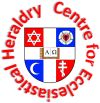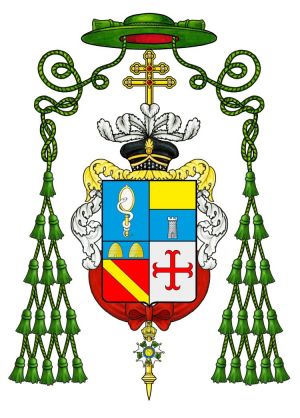Giacinto della Torre: Difference between revisions
Knorrepoes (talk | contribs) |
Knorrepoes (talk | contribs) |
||
| Line 17: | Line 17: | ||
===Origin/meaning=== | ===Origin/meaning=== | ||
Until 1813 he used, as was common, only a shield with his initials. | |||
His new arms were designed according to the style of Napoleon. The first quarter shows a mirror and snake, is a symbol for Imperial Senators, it symbolizes the prudent man, which must regulate its behavior by knowing its faults, the snake has always been considered the most prudent of animals. | |||
The second and third quarters are canting family arms; the second quarter shows the Della Torre amrs, the third stands for his mother';s family name, Melano, where the beehives are referring to the Latin mel (honey). | |||
The meaning of the cross is not clear, but may be a reference to Sardinia. | |||
According to the precise Napoleonic regulations, the coat of arms is completed with four lambrequins (two gold and two silver), a touch of black velvet, against counter-ermine, surmounted by five silver feathers; the decoration of the Napoleonic Légion d’Honneur hangs from the shield; all enclosed within a blue cloak lined with silver or, as in our case, a green galero of the rank of archbishop. | |||
{{media}} | {{media}} | ||
Revision as of 05:00, 6 May 2021
Religious or Ecclesiastical heraldry portal
This page is part of the Ecclesiastical heraldry portal |
Heraldry of the World |
|
Catholic heraldry
|
Other Christian churches Other religions
|
GIACINTO DELLA TORRE
Born : March 15, 1747
Deceased : April 8, 1814
Archbishop of Sassari, 1790-1797
Archbishop ad personam of Acqui, 1797-1805
Archbishop of Torino, 1805-1814
Official blazon
- (fr) Ecartelé : au 1 des comtes-sénateurs ; au 2, coupé d'or, et d'azur à la tour d'argent ; au 3 de gueules à la bande d'or, au chef d'azur chargé de 2 ruches d'or ; au 4 d'argent à la croix ancrée et neslée de gueules.
- (it) Inquartato: al primo d’azzurro allo specchio d’oro nel quale si guarda un serpente d’argento; al secondo troncato 1) d’oro e 2) d’azzurro, alla torre d’argento; il terzo di rosso alla banda d’oro, col capo cucito d’azzurro caricato di due arnie d’oro; il quarto d’argento alla croce ancorata di rosso.
Origin/meaning
Until 1813 he used, as was common, only a shield with his initials.
His new arms were designed according to the style of Napoleon. The first quarter shows a mirror and snake, is a symbol for Imperial Senators, it symbolizes the prudent man, which must regulate its behavior by knowing its faults, the snake has always been considered the most prudent of animals.
The second and third quarters are canting family arms; the second quarter shows the Della Torre amrs, the third stands for his mother';s family name, Melano, where the beehives are referring to the Latin mel (honey).
The meaning of the cross is not clear, but may be a reference to Sardinia.
According to the precise Napoleonic regulations, the coat of arms is completed with four lambrequins (two gold and two silver), a touch of black velvet, against counter-ermine, surmounted by five silver feathers; the decoration of the Napoleonic Légion d’Honneur hangs from the shield; all enclosed within a blue cloak lined with silver or, as in our case, a green galero of the rank of archbishop.
Contact and Support
Partners:
Your logo here ?
Contact us
© since 1995, Heraldry of the World, Ralf Hartemink 
Index of the site












